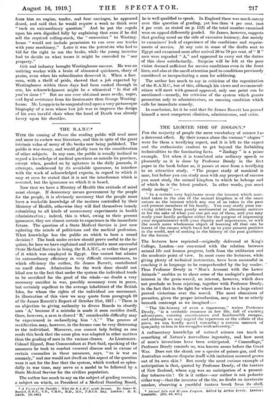THE R.A.M.C.* WITH the coming of Peace the reading public
will tend more and more to eschew war literature, and this in spite of the great intrinsic value of .many of the books now being published. The public is war-weary, and would gladly turn to the consideration of other subjects. In any case, the public is usually inclined to regard a knowledge of medical questions as outside its province, except when, goaded on by agitators in the daily journals, it attempts, undeterred by its avoidable ignorance, to interfere with the work of acknowledged experts, in regard to which it may at once be stated that it is not the interference which is resented, but the ignorance on which it is based.
Now that we have a Ministry of Health this attitude of mind must change. If democracy means government by the people for the people, it is obviously necessary that the people must have a workable knowledge of the matters controlled by their Ministry of Health, otherwise they will find themselves tamely submitting to all kinds of unnecessary experiments in health administration ; indeed, this is what, owing to their present ignorance, they are almost certain to. experience in the immediate future. The question of a State Medical Service is just now agitating the minds of politicians and the medical profession. What knowledge has the public on which to base a sound decision ? The book under review should prove useful to the in- quirer, for here we have explained and criticized a most successful State Medical Service in being, the R.A.M.C., or rather that part of it which was employed in Egypt. One cannot but admire its extraordinary efficiency in very difficult circumstances, to which efficiency the author, Si James Barrett, contributed no small share. Admiration for the work done should not blind one to the fact that under the system the individual tends to be sacrificed for the good of the whole—no doubt a very necessary sacrifice in war, possibly necessary even in peace, but certainly repellent to the average inhabitant of the British Isles, for whom the rights of the individual are sacrosanct. In illustration of this view we may quote from paragraph 10 of Sir James Barrett's Report of October 31st, 1917: "There is no objection to giving authority to divers Boards to classify men A,' because if a mistake is made it soon rectifies itself. Once, however, a man is classed B,' considerable difficulty may be experienced in reclassifying him A.' " The process of rectification may, however, in the former case be very distressing to the individual. Moreover, one cannot help feeling as one reads this book that the same plan was adopted in other matters than the grading of men in the various classes. As Lieutenant- Colonel Elgood, Base Commandant at Port Said, speaking of the measures he took to combat venereal disease and in excuse of certain anomalies in these measures, says, " so is war an anomaly," and one would not dwell on this aspect of the question were it not for the fear that the system, which worked so splen- didly in war time, may serve as a model to be followed by a State Medical Service for the civilian population.
The author has much to say on the subject of grading recruits, a subject on which, as President of a Medical Standing Board,
• A Vision of the Poittble : What the R.A.AI:C. might Be-one. B Tamei W. Barrett, K.B.B.,. C.B., C.M.G., M.D., M.S., rag. London : 1i. K. Lewis. lea. net]
he is well qualified to speak. In England there was much outcry over this question of grading, yet less than •4 per cent.. (not 4 per cent. as stated on p. 112) of the total number examined were on appeal differently graded. Sir James, however, suggests that grading erred on the side of excessive leniency, due mainly to examiners' lack of experience of the conditions and require- ments of service. At any rate in some of the drafts sent to Egypt and examined soon after arrival 50 to 70 per cent.. of " B " men were regraded " A," and appeared to carry out the duties of this class satisfactorily. Surprise will be felt at the poor vision deemed sufficient for service conditions even in the front. lines, and also at the small attention paid to conditions previously considered as incapacitating a man for soldiering.
The author has much to say in criticism of the organization of the R.A.M.C., but of this, although his views and recommend- ations will meet with general approval, only one point can be mentioned—namely, his criticism of the system which grants promotion only to administrators, an amazing condition which calls for immediate remedy.
In conclusion, let it be said that Sir James Barrett has proved himself a most competent clinician, administrator, and critic.


































 Previous page
Previous page